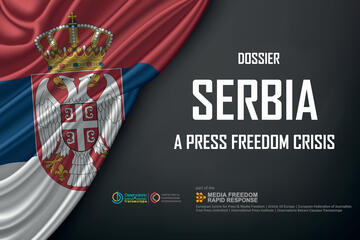
Dossier: Serbia, a press freedom crisis
The partners organisation of the Media Freedom Rapid Response (MFRR) will conduct a mission to Serbia between 7-9 April to meet with journalists, media stakeholders and law enforcement authorities amidst a rapidly worsening media freedom crisis. The visit comes as independent media and those covering ongoing nationwide anti-corruption protests face an increasingly dangerous climate of attacks, harassment, death threats, smears from leading public officials, as well as legal threats, and ongoing regulatory and financial pressure.
This curated collection of articles is the result of the work of OBCT's network of correspondents. It provides a comprehensive narrative of the latest events shaking the country and the difficult situation journalism faces in reporting these events to the public.
The broader context
Novi Sad: crime or tragedy?
On November 1st, the roof of the Novi Sad station - recently rebuilt by Chinese companies - collapsed, causing 14 deaths and dozens of injuries. Thousands of citizens took to the streets, giving rise to protests that also turned violent
[ITA-ENG]
Serbia protests
In Serbia, the mobilisation and popular protests against corruption and for justice for the victims of the collapse of the roof of the station in Novi Sad continue. A detailed account of the last few days
[ITA-ENG]
Two Serbias, two realities
Two different countries and two different realities were seen on the streets of Serbia last weekend. On one side, tens of thousands of students and citizens marching from city to city calling for the rule of law; on the other, the faithful of President Vučić, transported by bus and train at the expense of taxpayers
[ITA-ENG-BHS]
Ćacilend and the attempts to create incidents in Belgrade
The oceanic demonstration on Saturday, March 15 in Belgrade was repeatedly obstructed, with buses and trains cancelled and groups of fake students "wanting to return to class" supported by veterans of the infamous Red Berets
[ITA-ENG-BHS]
Serbia: corruption, arrests and protests
Serbian President Aleksandar Vučić has been calling for a generic "fight against corruption" for twelve years. Until a few weeks ago, this was just empty rhetoric. Now, to calm the protests, some arrests have been made, but they remain unconvincing and the protests are not subsiding
[ITA-ENG-BHS]
The crisis of media in Serbia
Serbia: media independence is an exception rather than the rule
Increasing political and financial pressure threatens the independence and editorial autonomy of many media outlets in Serbia. We interviewed Irina Milutinović, Senior Research Associate at the Institute of European Studies in Belgrade and co-author of the Country Report on Serbia of the Media Pluralism Monitor 2023
[ITA-ENG-BHS]
Serbian journalism, stronger EU support is needed
Amid a systematic erosion of editorial independence by the government, stronger international support is needed to uphold media freedom in the country. An interview with Igor Božić, news director of the independent N1 TV
[ITA-ENG-BHS]
Rule of Law and Media Freedom in Serbia: a Shadow Report
This Shadow Report focuses on the third section of the Commission's Rule of Law Report on Media Freedom and Pluralism and provides an up-to-date analysis of the Serbian media landscape, highlighting not only positive developments, but more importantly, emerging risks and challenges
[ENG-BHS]
Digital security in Serbia: another challenge to media freedom
Media outlets in the country are increasingly exposed to cyber attacks, online threats and manipulations. We talked about digital security and its impact on independent journalism in Serbia with Bojan Perkov, digital policy coordinator at SHARE Foundation
[ITA-ENG]
This content is part of the Media Freedom Rapid Response (MFRR), a Europe-wide mechanism which tracks, monitors and responds to violations of press and media freedom in EU Member States and Candidate Countries. The project is co-funded by the European Commission.


